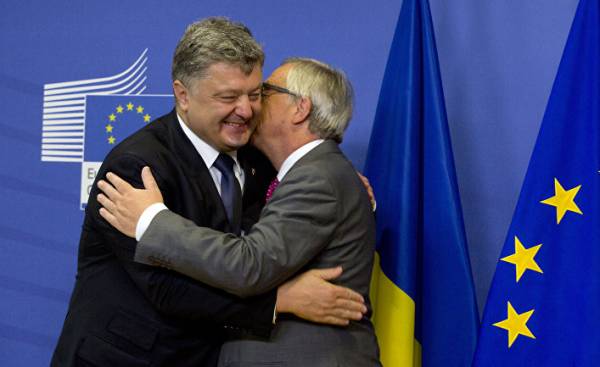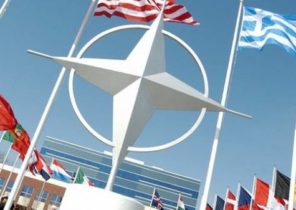
The conflict over the Donbass and annexation of Crimea has had a great impact on the economy of Ukraine. Donetsk coal basin played the role of economic center of the country, producing marching on the export of steel is one of the few products that contributed to the development of other sectors of the Ukrainian economy. On the other hand, deprived of the Crimea, Ukraine has lost important from a geopolitical point of view port.
Economic factors continue to shape the direction of the current situation. Should we on this background to expect a further escalation of the conflict? And as the economic situation in the Ukraine affect international stability of this state?
Since the 1990s, the main trading partner of Kiev was Moscow. Now trade with Russia is experiencing a sharp decline. In practice, it is, on the one hand, means that the Kremlin is losing its leverage over Kiev. With another — the Kremlin is afraid of a deepening of this process, which could be a contributing factor to the escalation of tension.
In Ukrainian exports decreased, the share of high-tech products, which is driving Ukraine to the role of the peripheral countries. The shipbuilding industry is experiencing a crisis; can save the steel products supply, building materials and raw materials, but a much greater share in exports are beginning to take the grain, vegetable oil and other agricultural products (39,9%), which can also be called a symptom of a peripheral state. The same conclusions arise when analyzing the structure of imports to the Ukrainian market. A large proportion (43.6 per cent) take the products of engineering, electronics and chemistry.
Between the hammer and the second hammer
Precisely the peripheral position of Ukraine made this country a field of struggle for influence between the two centers of power. One force is the European Union, which sees in Ukraine, if not the key, important market for their goods (primarily from Central Europe, but also Germany and other Western countries of the continent). Kiev is also a potential supplier of raw materials, food products and other low-tech products.
An important role continues to play the Ukrainian market for Russia, which remains the main competitor of the Western world in Eastern Europe: the volume of Russian exports to this country is of 8.18 billion dollars (2,6% of the total).
Spheres of influence, surprisingly, defending Ukraine, as neither Russia nor the European Union is disadvantageous sharp shock. This gives Kiev relative stability, but does not guarantee the rapid conclusion of the conflict. It should be assumed that he, with varying degrees of intensity, will continue to fester, as it happens in Moldova, Georgia, Bosnia and Herzegovina or in Kosovo.
The loss of Crimea has become for Ukrainians a painful blow, especially in geopolitical and military terms. Thanks to the black sea fleet base in Sevastopol, Russia managed relatively quickly to win in 2008, Georgia. The Peninsula also plays a significant role in Russian operations in the middle East and North Africa. His position cannot be underestimated in the context of growing instability in the Balkans.
In the Crimea was flourishing tourist business: in 2014, before the conflict, the Peninsula arrived about six million people, 25% of whom were citizens of the Russian Federation.
The main treasure of the Crimea, as reported by the channel Russia Today, hidden in the Black sea South of the Peninsula’s gas fields, the potential of which is estimated at 7 million tons of annual production. ExxonMobil and Shell signed a preliminary agreement with the Ukrainian authorities on the topic of deep-sea drilling, the cost of this contract is estimated at $ 1 billion. The only problem is that now the Kiev leadership does not have access to the field.
Much more important economic significance for Ukraine, the Donbass, whose contribution to the Ukrainian GDP amounted to 16% and the share in investments of about 15%. According to the service Euromaidanpress, the new government took in the Donbass under the control of the 47 companies, which further weakened the Ukrainian state.
In Luhansk and Donetsk oblasts accounted for about 27% of exports, which was $ 18.1 billion. According to Russia Direct, Ukraine failed to fill in the European market the losses that she suffered, deprived of access to the Russian market. In 2011, exports to Western Europe fell by about $ 5 billion.
After the Euromaidan, the annexation of the Crimea and the Donbas began in the war also drastically reduced the influx into Ukraine of foreign direct investment. According to estimates of Ukrainian experts, in 2014 the country’s GDP fell by 16.5%, but when you consider the loss of the Crimea and the Donbass — as much as 24%.
The risk of escalation of the conflict
And Kiev and Moscow have to consider the prospect of escalation of the dispute around the Eastern and southern borders of Ukraine against the background of deteriorating social situation. Ukrainian society suffers from the low standard of living: in 2015, GDP per capita amounted to only 7.5 thousand dollars, unemployment is kept at 10%.
As he writes in his new article, the expert of the Warsaw Center for Eastern studies Tadeusz Olshansky (Tadeusz Olszański), “in a relatively egalitarian society that existed up to 1991, sharply escalated social inequalities, which people can not accept.” A serious problem is also the massive influx into cities villages and drug abuse, which was on par with alcoholism “social disaster”.
Best illustrated by the plight of Ukraine is the fact that its population has decreased by almost seven million people and, as analysts predicted the Centre for Eastern studies, this trend will only increase. This development contributes, in particular, the liberalization of the visa policy of the EU. The level of public discontent is quite high. Ukrainians compare their situation with life not only in the EU or Russia, but even in Belarus, where the Lukashenka regime is unable to provide its citizens with stability and security. The liberalization of the visa regime can be called in this context a positive phenomenon as it allows at least partly to make life easier for immigrants and their families.
Their earnings have an impact on the economy. In 2015, as he wrote in the newspaper Obserwator Finansowy Michal Kozak (Kozak Michał), the amount of funds which were transferred to Ukraine, labour migrants, made up 6.45% of GDP. Step of the EU is, of course, a sensible solution, but it will only exacerbate the “brain drain” from Ukraine.
The Prospects Of The Kremlin
Ukraine, unfortunately, prefers to an object than an active participant in the unfolding of the game. If the Kremlin deems relations with such States as France, Germany or Italy stable, and the West is in Ukraine the same position which was occupied by the French in respect of Gdansk in 1939, the Russian authorities may decide, for example, providing a more convenient communication with the Crimean Peninsula.
The sharp deterioration of relations with the West, the decline in energy exports, the new turn towards China, or other Eastern markets (e.g. India and Iran) — in other words, the destruction of the existing cooperation model between the EU and Russia, will turn to security of Ukraine with negative consequences.
An important factor for the stabilization of the situation in this country can become China’s economic expansion. If the Chinese decide to increase the volume of investments to Ukraine and stay there for a longer period, the aggressive policy of Russia will come into direct conflict not only with the interests of Kiev and Beijing. And this enemy is quite another category. However, while the Ukrainian leadership refers to Chinese proposals with great caution.
Successfully balancing between Russia, the European Union and China will not be easy. To keep the balance the harder that Ukraine was subject to pressure from three sides, not being able to affect the intensity of this pressure.
However, in a globalized world, Kiev will not be able to stay long alone, and sooner or later one side will take him under his wing. Russia occupies the decisive position, the EU offers the most attractive model of development and China is not going to interfere in internal Ukrainian politics. Perhaps the Ukrainians are aware that the reforms, which had failed to hold their country in the last quarter of a century, should be accompanied by integration with the international market. They will have to make a choice, otherwise someone will choose them.
Yan Mus — employee of the Warsaw Academy of Finance and business Vistula







